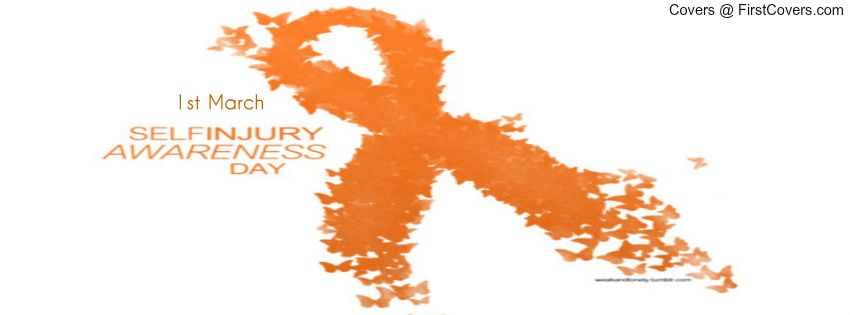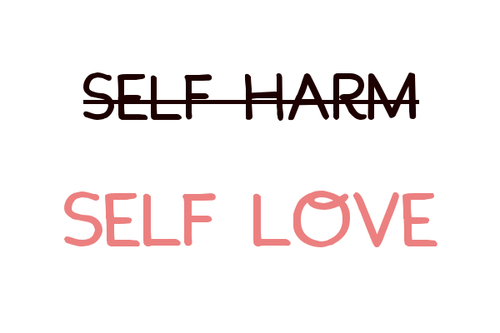Self-harm Awareness Day: A personal reflection

To me, self harm awareness day is an incredibly important day. A 13 year battle with self harm that I'm yet to feel I have truly left behind means I have more than my fair share of experiences that show why more awareness of this issue is so incredibly necessary.
Out of the 13 years of this struggle it's only been for 4 of them that anyone apart from myself has known about it.
Out of the 13 years of this struggle it's only been for 7 of them that I, myself, the one with this problem has know about it.
This may be surprising, or you may not understand what I mean. I'm going to try to explain.

It's not at all uncommon to hear people questioning the effectiveness of "awareness" of topics such as self harm. Arguing that it "puts ideas in people's heads" etc. This is a very real issue that needs to be considered carefully but I really want to break the myths surrounding self harm that people only do it because their friends do, because they saw it on telly, because the school says people get extra support if they do it, because celebrities talk about it.
The prevalence of self harming behaviour is not increasing because we are talking more about it. The amount of people willing to accept help and therefore be known to services is increasing because we are talking about it. And this means better outcomes for those struggling as they no longer have to feel alone.
When I started self harming at 8 years of age. I wasn't aware that "self harm" was a thing. I'd never heard the term, never seen it on tv, didn't have friends that did it, I wasn't aware of it. And yet I found myself unable to last a day without physically and intentionally hurting myself several times a day. And I felt, overwhelmingly, that my feelings and this behaviour wasn't something I should share.
I had difficult feelings, I'd experienced difficult stuff, I didn't know how to cope. I relied on self harm and to this day I have no idea how or why it was this that had become a part of my life or a behaviour I engaged in. Why didn't I use talking to cope with feeling bad? Or art work? Or singing?
There's a science behind self harm. Most people couldn't imagine deliberately injuring their bodies, but it has been found in research studies that some people have a specific connection in their brains meaning that bodily injury provides a sort of temporary relief from emotional turmoil. For example, Schmahl et al. scanned the brains of people with a history of non-suicidal self-injury during a painful experimental task designed to mimic their harming behaviour and found that the pain led to decreased activity in the areas of the brain associated with negative emotion.
If I had known that this was a recognised response to emotional pain I may not have felt so alone, isolated and different to everyone around me, as I did for many years. If I had known I didn't have to hide what I was doing and that there was help to feel happier I may have been saved from the many more years of darkness and desperation.
By the time I was 14 I had become aware of "self harm” as a concept and I had began to recognise that this was what I had been struggling with. Perhaps this could have been the breakthrough moment of my story. When I got help and got better. Sadly not. I became aware of self harm not through positive informative awareness campaigns but through the stigmas that surround it. People joked about the "emo kids" and the attention seekers and psychos and people who "couldn't even kill themselves".
Why would I have spoken up then? When already feeling isolated and alone and different why would I subject myself to being labelled with all these negative things by my peers.
My parents found out and they didn't know how to cope - how would they? No one teaches you to support someone through this.
School found out but never spoke to me or gave me any information or support.
I went to a counsellor who never even addressed it despite having been told about its severity.
CAMHS services addressed it a bit but as I was also battling anorexia, this was the main focus. Even when I was admitted to an inpatient hospital, because it was an eating disorder specialist unit, many staff had little and often outdated knowledge of self harm.
Since being discharged from inpatient treatment, I have had many encounters with incredibly ignorant professionals from A&E staff and consultants on general wards to Phlebotomists and GP’s.

Whilst I do want to highlight that I have also been lucky enough to receive some incredible support from wonderfully informed and caring people, I know that my story of experiencing just how real the need for more awareness is, is not uncommon.
It’s not people’s fault that they don't know how to help, or that they don't understand, or that they believe the myths. But in order to prevent the 1 in 12 young people in the UK, who at some point in their lives turn to self-harm, from becoming more isolated, having lower self-esteem, fighting such a hard battle on their own and not having the best chance possible to recover - we need to inform people, we need to offer hope to people.
Awareness is needed. It's essential, it's vital, it's critical. For those who are suffering but not even aware of what they are fighting and that’s its common and can get better; for people who find out about a loved one but feel helpless; for professionals who have the potential to be a crucial part of someone's recovery; and for the general population, whose discrimination, intentional or not, is damaging and who need to know how to talk appropriately about, and support someone with, self harm.
You will know someone who is struggling. Awareness reduces stigma. Self-harm is nothing to be ashamed of, but stigma is.
The work Phase is doing in raising awareness, promoting mental health, preventing people reaching the point of needing self-harm and supporting those already struggling is incredibly important. No one should have to feel their only option is to harm themselves and more importantly no one should feel they have no one to turn to if they reach this point.